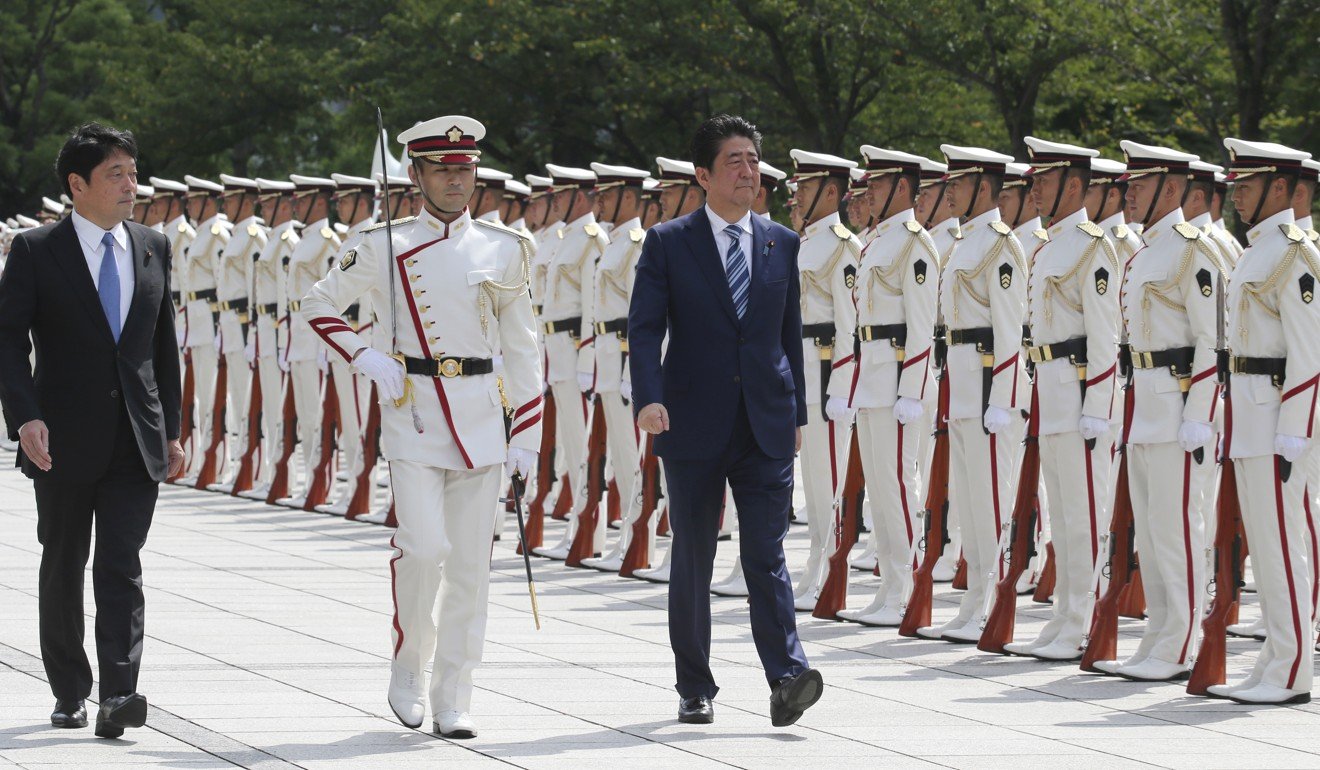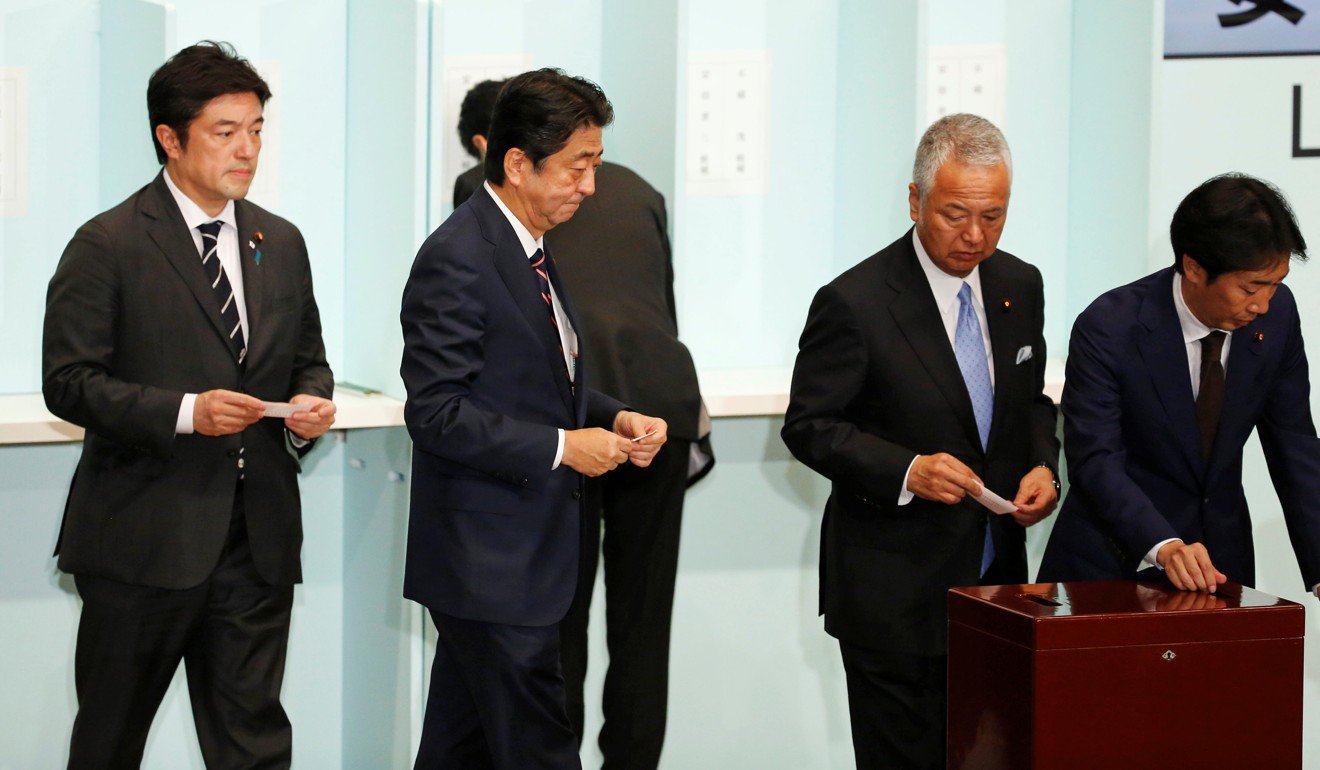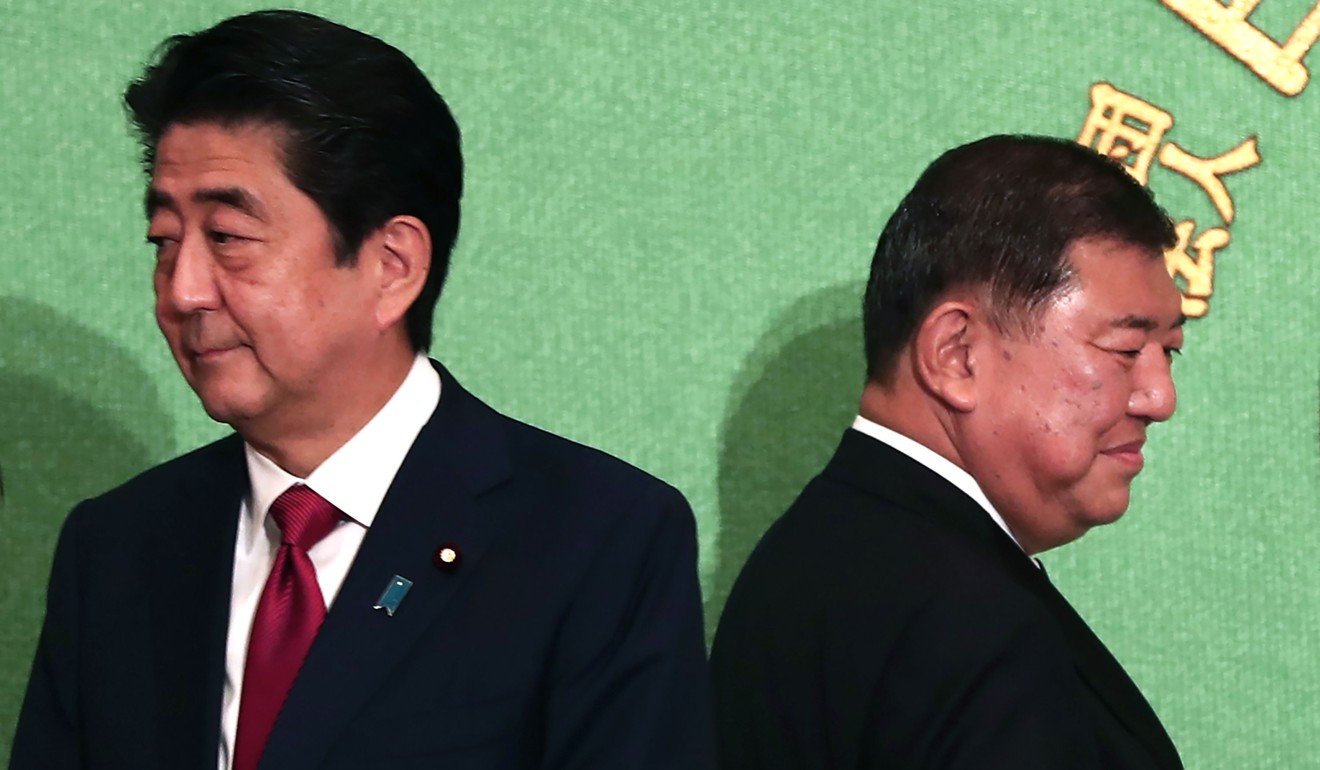
Japan’s Shinzo Abe wins landslide party vote, looks to three more years as PM
Abe on course to become Japan’s longest-serving premier and realise his dream of reforming the constitution, securing 553 votes against 254
Prime Minister Shinzo Abe won comfortable re-election as leader of his ruling party on Thursday, setting him on course to become Japan’s longest-serving premier and realise his dream of reforming the constitution.
The 63-year-old conservative secured 553 votes against 254 won by former defence minister Shigeru Ishiba, a hawkish self-confessed “military geek”, in a two-horse race for leader of the Liberal Democratic Party.
The win effectively hands Abe three more years as prime minister, giving him the chance of breaking the record for the nation’s longest serving premiership held by Taro Katsura, a revered politician who served three times between 1901 and 1913.

Public support for Abe – a political thoroughbred whose grandfather and father both held power – has recovered despite a series of cronyism and cover-up scandals. Disaster responses by Abe’s government and his recent diplomatic activities have worked in his favour, some political experts have said.
With the victory, Abe is expected to speed up the pace of preparations to revise the supreme law for the first time since it took effect in 1947.
“It’s now time to tackle a revision to the Constitution. Let’s work together to create a new nation for the sake of the people,” he said.
The conservative leader has proposed clarifying the legal status of the Self Defence Force (SDF) in war-renouncing Article 9 to put an end to arguments the Japanese troops are “unconstitutional”.
Despite objections by some legal scholars, the government has maintained the position that the forces are “constitutional” as it interprets the article as not banning Japan from possessing the “minimum necessary” capability to defend itself.
It’s now time to tackle a revision to the Constitution
Now reconfirmed in power, Abe will head to New York this weekend to attend the UN General Assembly and hold a summit with US President Donald Trump.
Abe and Trump, who enjoy each other’s company on the golf course and are close diplomatic allies, are expected to analyse the latest inter-Korean summit.
But they will also have to confront a growing trade dispute as Trump sees Tokyo among “unfair” trade partners.
While Japanese voters put the economy and social security as their top priorities, Abe aims to use the election to push his dream of reforming the country’s post-second World War pacifist constitution.
Nationalist Abe has frequently voiced his wish to rewrite the charter, imposed by the victorious US occupiers, which forces the country to “forever renounce war” and dictates that armed forces will “never be maintained”.

Abe also stressed the need to promote disaster prevention measures and infrastructure building and vowed to put emphasis on diplomacy, saying he wants to take stock of post-war foreign policy.
Following the victory, the prime minister is planning to reshuffle his Cabinet and the party’s leadership line-up after returning home in late September from New York, where he is expected to attend the UN General Assembly, according to a senior lawmaker of the ruling bloc.
The Cabinet is then considering convening an extraordinary Diet session later in the month, government sources said.
Much attention is on whether the LDP will submit constitutional revision proposals to the parliament session, as Abe urged during an election campaign that lasted less than two weeks.
Abe insists any changes would merely remove the country’s well-equipped SDF from the constitutional paradox whereby they should not technically exist.
“It’s time to stipulate both the Self-Defence Forces and the protection of Japan’s peace and independence in the constitution,” Abe said in his last stump speech in Tokyo.
But any changes to the text would be hugely sensitive in pacifist Japan and almost certainly greeted with fury in China and the Koreas, 20th-century victims of Japanese military aggression.
Even if Abe manages to force a revision through parliament, he would face a referendum, raising the prospect of a Brexit-style political meltdown if the people vote against him, said Yu Uchiyama, political scientist from the University of Tokyo.

In addition, surveys show that tinkering with the legal text is far from top of most Japanese voters’ to-do list, as the country faces an ageing and declining population and a still-sluggish economy.
During his nearly six years in office, Abe has sought to beat chronic deflation and achieve sustainable growth through his “Abenomics” policy package.
Acknowledging concerns over the economic outlook, Abe said he plans to introduce “bold” stimulus measures to ease the expected impact of a tax hike scheduled for October next year.
Japan’s economy has been expanding for the past few years at a slow pace thanks to the Bank of Japan’s ultra-loose monetary policy and huge government spending, which have led to a weak yen – a key positive element for Japanese exporters.
But analysts warned US-led trade wars could be a major risk factor for an economy still struggling to win a long battle against deflation.
Local media said Abe plans to reshuffle his cabinet on October 1. However, he is expected to retain Vice Prime Minister and Finance Minister Taro Aso, a political ally who has backed his “Abenomics” strategy to stimulate the world’s third-largest economy.

.png?itok=arIb17P0)